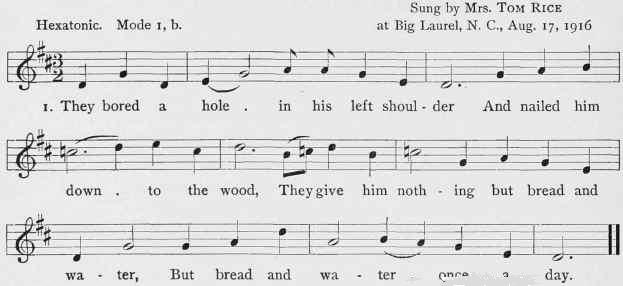They Bored a Hole- Rice (NC) 1916 Sharp D
[My title. From English Folk Songs from the Southern Appalachians, 1917 Campbell and Sharp; also 1932 Sharp and Karpeles Vol. I. This single stanza is all that was given. This unusual text (the boring of the shoulder from Child A) is also found in Davis B. Here's more from the Brown Collection:
"There are certain interesting variations among these many texts. Kittredge, in the note above referred to, remarks that some of the American texts differ from the broadsides in retaining a detail of the Turks' barbarous cruelty: a hole is bored in Beichan's shoulder by means of which he is harnessed and becomes a draft-animal. Thus in Child A:
For thro his shoulder he put a bore.
An thro the bore has pitten a tree,
An he's gard him draw the carts o wine.
Where horse and oxen had wont to be.
Similarly in B D E H I N. The word "tree" here means "draught-tree," the pole of a wagon or cart by which it is attached to the draft animal. "Tree" in this sense was apparently not an acceptable locution, was not understood in America ; Henry's Tennessee text and our version E change it to "key," two of the West Virginia texts and the only text in TBV that retains this feature change the word to "rope" and the other West Virginia text to "string." Other American texts that keep the word change the meaning; the "tree" is now that to which the captive is tied (chained, nailed, bound, fastened, sometimes around his middle), giving a quite different picture. So BBM D, TBV E, SharpK A E, JAFL xxviii 150, XXX 295, and our A version."
R. Matteson 2012, 2014]
They Bored a Hole (my title)- Rice (NC) 1916 Sharp; Young Beichan D

They bored a hole in his left shoulder,
And nailed him down to the wood,
They give him nothing but bread and water,
But bread and water once a day.